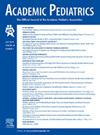青少年ADHD药物治疗与抑郁症状:一项回顾性纵向研究
IF 2.8
3区 医学
Q1 PEDIATRICS
引用次数: 0
摘要
目的:研究生活在资源不足社区和/或被认为是少数群体成员的青少年中,较高的注意力缺陷/多动障碍(ADHD)药物覆盖率是否与较低的抑郁症状相关。方法:在这项回顾性队列研究中,年龄在12-18岁的ADHD青少年在每年的健康检查中完成了抑郁症筛查。病人在初级保健诊所就诊,该诊所主要为来自资源不足社区的少数族裔、享受医疗补助的年轻人提供服务。我们计算ADHD药物覆盖率为基于电子健康记录中的处方在过去36个月内可用药物的天数百分比(范围为0%至100%)。零膨胀负二项回归模型评估药物覆盖率是否与患者健康问卷测量的抑郁症总分差异相关。结果:我们纳入了2,569名青少年(66.6%为男性,70.9%为黑人,86.6%为医疗保险参保),共4,145次就诊。用药覆盖率较差(平均覆盖天数18.5%,标准差26.8%)。在整个样本中,较高的药物覆盖率与较低的抑郁评分无关。然而,在排除0%药物覆盖率的患者后,高覆盖率与低抑郁评分之间存在显著关联。患有精神/行为健康合并症的患者、女性患者以及生活在机会得分较低社区的患者的抑郁症状得分较高。结论:在我们的样本中,更大的ADHD药物覆盖率与抑郁症状的小幅但潜在的临床显著减少有关,这强调了在更多样化的人群中研究ADHD药物对抑郁的保护作用的必要性。本文章由计算机程序翻译,如有差异,请以英文原文为准。
ADHD Medication and Depressive Symptoms in Adolescents: A Retrospective Longitudinal Study
Objective
To examine whether higher attention-deficit/hyperactivity disorder (ADHD) medication coverage was associated with lower depressive symptoms among adolescents who live in underresourced neighborhoods and/or identify as a member of a minoritized group.
Methods
In this retrospective cohort study, adolescents aged 12 to 18 years with ADHD completed a depression screener at their annual well visit. Patients were seen at a primary care office that predominantly serves minoritized, Medicaid-insured youth from underresourced neighborhoods. We calculated ADHD medication coverage as the percentage of days in which medication was available in the prior 36 months based on prescriptions in the electronic health record (range 0%–100%). Zero-inflated negative binomial regression models assessed whether medication coverage was associated with differences in total depression scores, measured by the Patient Health Questionnaire.
Results
We included 2569 adolescents (66.6% male, 70.9% Black, 86.6% Medicaid-insured) with 4145 well visits. Medication coverage was poor (mean = 18.5% days covered, standard deviation = 26.8%). Higher medication coverage was not associated with lower depression scores in the overall sample. However, after excluding patients with 0% medication coverage, there was a significant association between higher coverage and lower depression scores. Depression symptom scores were higher in patients with mental/behavioral health comorbidities, those of female sex, and those living in neighborhoods with lower opportunity scores.
Conclusions
Greater ADHD medication coverage was associated with a small, yet potentially clinically significant decrease in depression symptoms in our sample, underscoring the need to investigate the protective effect of ADHD medication on depression in more diverse populations.
求助全文
通过发布文献求助,成功后即可免费获取论文全文。
去求助
来源期刊

Academic Pediatrics
PEDIATRICS-
CiteScore
4.60
自引率
12.90%
发文量
300
审稿时长
60 days
期刊介绍:
Academic Pediatrics, the official journal of the Academic Pediatric Association, is a peer-reviewed publication whose purpose is to strengthen the research and educational base of academic general pediatrics. The journal provides leadership in pediatric education, research, patient care and advocacy. Content areas include pediatric education, emergency medicine, injury, abuse, behavioral pediatrics, holistic medicine, child health services and health policy,and the environment. The journal provides an active forum for the presentation of pediatric educational research in diverse settings, involving medical students, residents, fellows, and practicing professionals. The journal also emphasizes important research relating to the quality of child health care, health care policy, and the organization of child health services. It also includes systematic reviews of primary care interventions and important methodologic papers to aid research in child health and education.
 求助内容:
求助内容: 应助结果提醒方式:
应助结果提醒方式:


